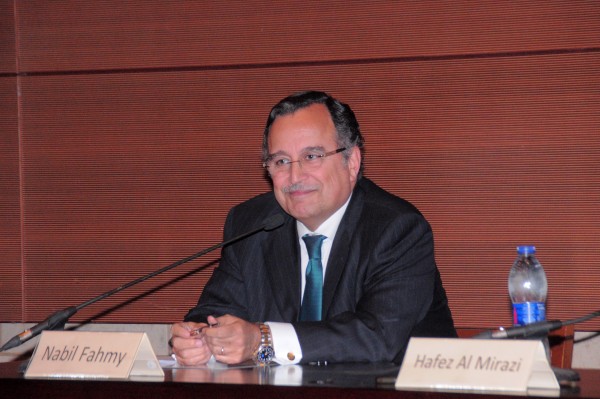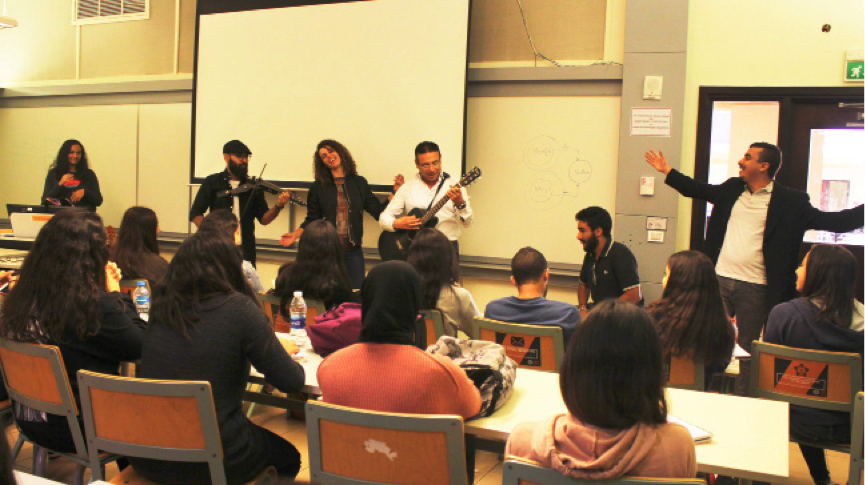Fahmy Maps Out Egypt’s Global Foreign Policy Vision
![Fahmy has been touring capitals around the world to boost political and economic ties [Courtesy: AUC Office of Communications]](http://www.auccaravan.com/wp-content/uploads/2014/03/COMMUNICATIONS-OFFICE-nabil-fahmy-e1394528225212.jpg)
BY AHMED EL SEBAIE AND IBRAHIM ABUALLAIL
Egypt is at a point in time where it has to restructure its foreign policy and diversify its strategic and economic relations following the two revolutions of January 25 and June 30, said Nabil Fahmy, minister of foreign affairs, at a lecture on campus last week.
“As Egypt looked East, it must also look South,” Fahmy said, explaining the importance of Egypt’s “reintegration” with the African continent.
He added that Egypt is an integral part of Africa and the partnership between Egypt and other African countries might provide new economic opportunities.
Fahmy then focused on Ethiopia’s plan to build a dam on the Nile River, which he says is necessary to meet its energy needs.
Egypt is not opposing the idea of building The Great Renaissance Dam, Fahmy said, but Cairo has tried to pressure Addis Ababa to come to the negotiating table.
In fact, Egypt offered to provide its own equity on the dam and help Ethiopia build it, provided that they meet certain specifications that do not affect Egypt’s share of the Nile’s water.
The Egyptian offer however, was turned down, he said.
The Grand Renaissance Dam is currently under construction along the Blue Nile in Ethiopia and it has been a source of concern in Egypt out of fear it might affect the country’s share of the river’s water.
He added that Egypt will continue to maintain and enhance its strategic relations with the United States and Europe.
Fahmy added that Egypt will seek to build relations with Russia in an attempt to reach “regional peace and security.”
Egypt also faces economic challenges. The Minister of Foreign Affairs said that the country will be facing “a widening gap” between the available resources and domestic demand in the future.
To secure its growing needs, Egypt will increasingly be looking abroad, he added.
Fahmy said that Egypt is now on the right path to democracy. He also reflected on Egypt’s historic role as a leader in the Middle East, and expressed his hope for Egypt to become a role model for other countries in the region to follow.
When asked about the future of the Muslim Brotherhood, he said that even though they were announced a terrorist organization, its members are still Egyptians and have the right to participate in the future political scene provided that they weren’t involved in any criminal or violent incident.
The financial assistance that was provided to Egypt by the Gulf countries is more of an investment package than aid, Fahmy said, explaining that providing such help is a matter of choice. Egypt is an influential country, and what happens here affects the rest of the Arab world, he added.
Commenting on the Ministry of Foreign Affairs’ stance towards the situation in Syria, Fahmy told The Caravan that among the ministry’s goals is to emphasize to the world that Egypt opposes dividing Syria.
“We need to preserve Syria as a state, unified in its territories,” he said.
Fahmy added that Egypt is against the use of international force against Syria, and that it is “in support of the resistance against the regime that does not want to respond to its own people.”
Fahmy received both his undergraduate and graduate degrees at AUC before setting up its school of Global Affairs and Public Policy and becoming its Dean. He was also the Egyptian ambassador to the United States and Japan.



